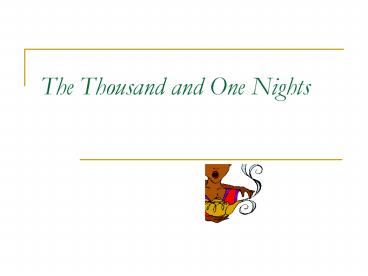The Thousand and One Nights - PowerPoint PPT Presentation
1 / 11
Title:
The Thousand and One Nights
Description:
The Thousand and One Nights The Thousand and One Nights Author: unknown Culture: Arab, from a collection of pre-Islamic Middle Persian tales. Time: 14th century Genre ... – PowerPoint PPT presentation
Number of Views:1371
Avg rating:3.0/5.0
Title: The Thousand and One Nights
1
The Thousand and One Nights
2
The Thousand and One Nights
- Author unknown
- Culture Arab, from a collection of pre-Islamic
Middle Persian tales. - Time 14th century
- Genre prose, contains lots of different genres
from poetry to prose adventure tales, romances,
etc. - Names to know Shahrazad, Shahrayar
3
1,001 Nights
- Oral and written versions existed side by side.
- The tales are rooted in daily life, but are made
magical by their settings, fantastic adventures,
and the intervention of sorcerers and demons
(djinn). - The Prologue sets forth the themes
- Lust, madness, violence, justice, retribution,
heroism.
4
The Narrator
- Shahrazad succeeds through the power of
story-telling (narrative) to ward off tyranny and
to suspend time. - Overall narrative structure nesting tales that
flow from and lead into each other. - Framing Narrative is set out in the Prologue.
5
Generic Importance
- This is one of the richest reservoirs of
narrative genres in Medieval times. E.M. Forster
in his Aspects of Fiction (1927) considers One
Thousand and One Nights to be the origin of the
modern novel. - The Greeks invented the novel in the Hellenistic
period (3rd-1st centuries BCE) but these were
adventure/romance tales only. - Novel form is developing in medieval Japan, as
well.
6
Two-part Narrative Structure
- Baghdad part the characters and action focus on
Baghdad in the time of Haroun al-Rashid. - Egyptian part characters and settings are
Egyptian, jinn are manipulated through talismans
rather than directly. - Tales reflect the influence of all the Islamic
world ( the Koran) as well as ancient Babylonian
Mesopotamian narratives and historical events
figures such as those surrounding Alexander the
Great.
7
Prologue
- Sets out the reason for the tale-telling, and the
main characters. - Explains why Shahzaman visits his brother
Shahrayar, why he is depressed, and what makes
him feel better. - Describes male/female sexuality
8
Male vs. Female P.O.V.
- Men are comfortable when in control
- Men react violently when they realize they do not
have control - Women dislike the bonds put upon and actively
seek escape - Women can be powerful as even Djinn cannot
control them - Some women and men do find balance
9
What to do when you have no control?
- When Shahrayar returns home he says, There is
not a single chaste woman anywhere on the entire
face of the earth Thus he plans to gain control
through violence. - Violent control comes with a heavy cost much
death - There is a reminiscence of Gilgamesh , He
continued to do this until all the girls
perished, their mothers mourned, and there arose
a clamor among the fathers and mothers, who
called the plague upon his head, complained to
the Creator of the heavens, and called for help
on Him who hears and answers prayers.
10
Aim of the Tales
- Shahrazads tales may be chosen to teach
Shahrayar that not all women are like his first
wife. - In many of the tales a benign but powerful woman
undoes the harm done by a bad woman. - The wicked characters are punished according to
their crimes, but are never put to death (unlike
all of Shahrayars other innocent wives!).
11
Conclusion
- After a thousand and one nights, Shahrayar
finally embraces Shahrazad as a virtuous woman
and gives over his unjust behavior. - She reveals their three sons.
- Dinarzad marries Shahzaman.
- The vizier becomes king in Shahzamans place.































